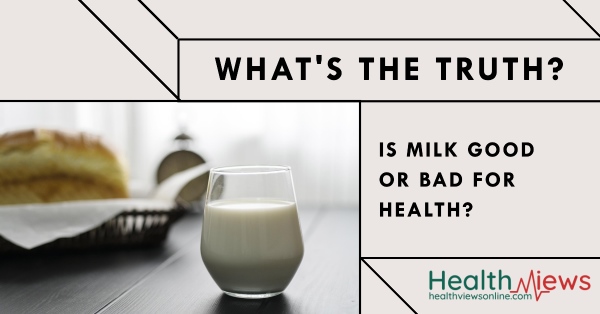When it comes to fulfilling the body’s requirement for essential nutrients, milk is a nutritious food that has been considered nature’s perfect food for ages. However, in recent years, the health benefits of milk and its adverse effects on a few have garnered a lot of attention. In this article, we aim to answer the million-dollar question: Is milk good or bad for health? We’ll consider various factors, including its nutrition profile, milk allergies, and other facts.
Milk Provides 10 Vitamins, 8 Minerals, and Other Essential Nutrients.
According to the USDA, consuming 1 cup of milk provides protein, lipids, carbohydrates, 8 minerals (Calcium, Potassium, Phosphorus, Magnesium, Sodium, Zinc, Copper, and Selenium), and 10 vitamins (Vitamin A, Vitamin B1, B2, B3, B6, Choline, Vitamin B12, Vitamin D, Vitamin E, Vitamin K). Essentially, milk contains everything except fiber and iron.
Also Read: Health Benefits Of Buffalo Milk: Nutrition Values, Precautions & Side Effects
Here’s the nutritional profile of 1 cup of Milk (240g):
| Protein | 8g |
| Energy | 146 kcal |
| Water | 215g |
| Lipids | 7.81g |
| Carbohydrates | 11.4g |
| Minerals | |
| Calcium | 300mg |
| Potassium | 366mg |
| Phosphorus | 246mg |
| Magnesium | 29.3mg |
| Sodium | 92.7mg |
| Zinc | 1mg |
| Copper | 0.002mg |
| Selenium | 4.64 µg |
| Vitamins | |
| Vitamin A | 78.1µg |
| Vitamin B1 | 0.137mg |
| Vitamin B2 | 0.337mg |
| Vitamin B3 | 0.256mg |
| Vitamin B6 | 0.149mg |
| Choline | 43.4mg |
| Vitamin B12 | 1.32µg |
| Vitamin D | 2.68µg |
| Vitamin E | 0.122mg |
| Vitamin K | 0.732µg |
So, nutrition wise milk is good for health, and indeed healthy.
However, the twist in the milk tale is the fact that it may not be suitable for everyone.. Yes, while milk is a nutritious beverage that provides essential nutrients, it may be unsuitable and/or also have side effects for some individuals.

Here are a few common side effects of milk consumption and who might experience them:
Lactose Intolerance:
One of the most common side effects of milk is lactose intolerance. This condition occurs when the body does not produce enough lactase, the enzyme needed to digest lactose, the natural sugar found in milk. Symptoms of lactose intolerance include bloating, gas, diarrhea, and abdominal discomfort after consuming milk or dairy products. Many people with lactose intolerance can tolerate small amounts of milk or choose lactose-free dairy products. (Source: NIH)
Acne
In some people, especially adolescents, consuming milk has been associated with acne flare-ups. This is thought to be related to the hormones and growth factors naturally present in milk. (Source: American Academy of Dermatology)
Milk Allergy
Some individuals have a milk allergy, which is an immune response to proteins found in milk, such as casein or whey. Milk allergy can cause symptoms ranging from mild, such as hives, itching, or swelling, to severe, including difficulty breathing or anaphylaxis. People with milk allergies must avoid all dairy products and may need to carry emergency medication (like epinephrine) in case of accidental exposure. (Source: American College of Allergy)
Also Read: LATEX ALLERGY: Types, Causes, Risk Factors, Symptoms & Home Remedy
Digestive Issues
Apart from lactose intolerance, some individuals may experience general digestive discomfort, such as cramping, bloating, or constipation, after consuming milk. This can be due to difficulties in digesting the proteins or fats in milk.
Increased Mucus Production
Some people believe that consuming milk can lead to increased mucus production, which may worsen symptoms in those with respiratory conditions like asthma or sinusitis. However, scientific evidence supporting this claim is limited. (Source: NIH)
Is Milk Good or Bad for Health?
It’s important to note that while these side effects can occur, many people tolerate milk well and benefit from its nutritional content. If you suspect that milk is causing adverse reactions for you or someone else, it’s recommended to consult a healthcare professional for proper evaluation and guidance. Additionally, alternative sources of calcium and other nutrients can be incorporated into the diet if milk is not well tolerated.

So, if you are wondering whether milk is good or bad for health? the answer is not straightforward. Milk can be a valuable source of essential nutrients for many individuals, providing protein, vitamins, and minerals that contribute to overall health and well-being. However, it’s essential to consider individual factors such as lactose intolerance, allergies, and dietary preferences when determining whether milk is suitable for you.




